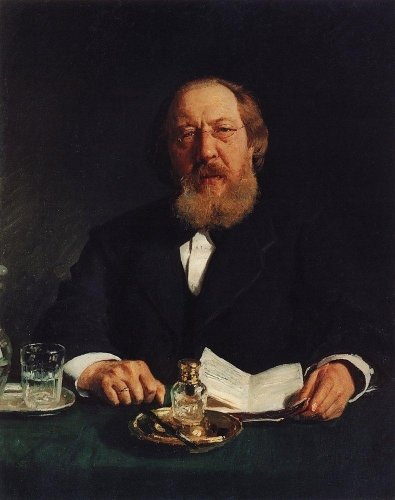Аксаков Иван Сергеевич (26 сентября (8 октября) 1823 – 27 января (8 февраля) 1886) - поэт, критик и публицист, надворный советник, идеолог славянофильства.
Родился в селе Надежино Оренбургской губернии. Младший сын писателя Сергея Тимофеевича Аксакова и Ольги Семеновны, урожденной Заплатиной.
В 1827 году семья переехала в Москву.
17 марта 1849 года Аксаков был арестован и доставлен в штаб корпуса жандармов. Поводом к аресту послужили его письма к отцу, в которых был заподозрен противоправительственный дух. Император Николай I ознакомился с делом Аксакова и выдал предписание жандарму: «Призови, прочти, вразуми и отпусти». 22 марта Аксаков был уже освобожден.
В том же году был командирован в Ярославскую губернию для ревизии городского управления, за которую взялся с большим рвением. Современники отмечали необыкновенную работоспособность Аксакова: «он занимался по 16 часов в сутки, постоянно писал, читал, делал справки в Своде Законов, и только по окончании служебных дел, как бы для отдохновения и забавы, принимался за стихи».
В 1852 году вышел в отставку и посвятил себя журналистике. Начал с издания «Московского сборника», который был запрещен в 1853 году. Принял предложение географического общества описать торговлю на украинских ярмарках, для чего почти год путешествовал по Малороссии. Издал «Исследование о торговле на Украинских ярмарках».
В 1855 году во время Крымской войны поступил в ополчение в Серпуховскую дружину.
В 1857 году путешествовал за границей.
В 1859 году издавал газету «Парус», которая вскоре была запрещена. Вместо нее стал выходить еженедельный журнал «Пароход», однако, затем Аксаков перешел в «Русскую беседу».
Весь 1860 год путешествовал по Европе, сопровождая больного брата Константина. Познакомился со многими выдающимися политическими и литературными деятелями западного и южного славянства.
В 1861 году он начал издавать газету «День», просуществовавшую четыре года. В 1867 году Аксаков издавал «Москву», выпуск которой неоднократно приостанавливался. С 1880 года до своей смерти издавал «Русь».
Кроме журналистики Аксаков много уделял времени общественно-политической деятельности, принимая активное участие в Славянском комитете. Его гражданская позиция во время войны за освобождение Болгарии принесла ему популярность, как в России так и в Болгарии. В конце 1870-х годов выдвигался на Болгарский престол.
Много путешествовал по России. Автор книги о Ф.И. Тютчеве.
Aksakov Ivan Sergeyevich (September 26 (October 8), 1823 - January 27 (February 8), 1886).
Poet, critic and essayist, court counselor, the ideologue of Slavophilism.
Born in the village Nadezhin, Orenburg province. The younger son of the writer Sergei Aksakov and Olga Semyonovna, nee Zaplatina.
In 1827 the family moved to Moscow. Initially educated at home. In 1838, in St. Petersburg, joined the newly founded School of Law, where he graduated in 1842. Returned to Moscow and began to serve in the Senate. But soon he entered first in Kaluga, and then in Astrakhan criminal chambers. In 1849 he moved to the Ministry of the Interior as an official for special assignments. Was sent on a secret mission in Bessarabia.
March 17, 1849 Aksakov was arrested and taken to the headquarters of the gendarmerie. The reason for the arrest was his letter to his father, which was suspected of anti-government spirit. Emperor Nicholas I got acquainted with the case and issued a warrant Aksakova gendarme: "Call upon, read, teach, and let go." March 22 Aksakov was already released.
In the same year he was sent to the Yaroslavl province to audit the municipal government, which has been undertaken with great zeal. Contemporaries noted the extraordinary performance Aksakov: "He worked 16 hours a day, constantly writing, reading, making reference to a set of laws, and only after the official affairs, as if for resting and fun, taken for poetry."
In 1852 he retired and devoted himself to journalism. Began with the publication of "Moscow Collection", which was banned in 1853. Accepted the offer of the Geographical Society to describe the trade fairs in Ukrainian, which for almost a year traveled to the Ukraine. Published "Study on the trade in the Ukrainian fairs."
In 1855, during the Crimean War he entered the militia in Serpuchovskay squad.
In 1857, traveled abroad.
In 1859 he published the newspaper "Sail", which was soon banned. Instead, it began to appear weekly magazine "Steamer", but then Aksakov moved to the "Russian conversation."
All 1860 traveled to Europe, accompanying sick brother Constantine. Met with many prominent political and literary figures of the western and southern Slavs.
In 1861 he began to publish a newspaper "The Day" that lasted four years. In 1867 Aksakov published "Moscow", the release of which was repeatedly suspended. From 1880 until his death he published "Rus".
Besides journalism Aksakov paid a lot of time socio-political activities, taking an active part in the Slavonic committee. His citizenship during the war for the liberation of Bulgaria earned him popularity, both in Russia and Bulgaria. In the late 1870s, was nominated for the Bulgarian throne.
Many traveled to Russia. The author of the FI Tyutchev.
Since 1865, married to Anna Feodorovna Tiutcheva - daughter of the poet Fyodor Ivanovich Tyutchev.
Died suddenly in Moscow from heart disease. He was buried in the Trinity-Sergius Lavra near Moscow. Emperor Alexander III responded to the death of the writer, sent a telegram to his widow: "The Empress and I have learned profound sorrow of the sudden death of your husband, who was respected as an honest man and a devoted Russian interests."




